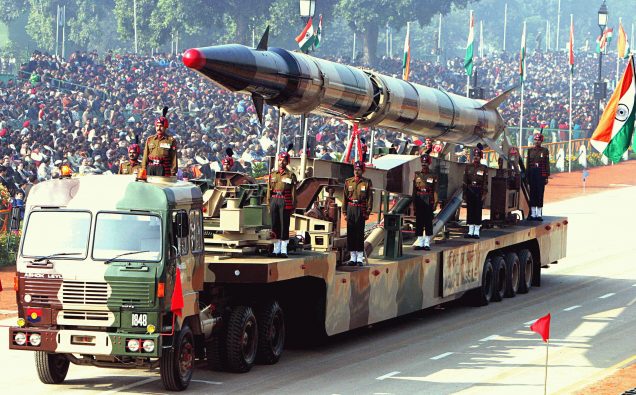
Indian Agni Missile, Photo Antônio Milena via Wikimedia Commons
India is recasting its nuclear weapons doctrine that would allow it to launch a preemptive nuclear strike against Pakistan’s arsenal in a war. But the policy change would have serious repercussions in the forms of an arms race even if the two South Asian powers do not go to war.
Indication of a shift in New Delhi’s nuclear doctrine flashed when Shivshankar Menon, India’s national security adviser from 2011 to 2014, wrote of this in his memoirs.
“There is a potential gray area as to when India would use nuclear weapons first” against a nuclear-armed adversary, Menon wrote. India “might find it useful to strike first” against an adversary that appeared poised to launch or that “had declared it would certainly use its weapons,” he added.
In Pakistan, Gen Ehsan ul Haq, former chairman of joint chief staff, said the news confirms Pakistan’s worst fears that India’s no-first-use was not credible.
In an opinion piece published in the New York Times on Saturday, columnist Max Fisher wrote that the move would have “significant ramifications for the already tenuous nuclear balance in South Asia.”
“India’s nuclear doctrine, which bars it from launching a first strike, but would loosen its interpretation to deem preemptive strikes as defensive,” he said, adding that It would also change India’s likely targets to make a nuclear exchange more winnable and, therefore, more thinkable.
Fisher pointed out that signs of a strategic adjustment in India are mounting.
“This comes against a backdrop of long-simmering tensions between India and Pakistan — including over state-sponsored terrorism and the disputed territory of Jammu and Kashmir — which have already led to several wars, the most recent in 1999,” the article says.
“The new interpretation would be a significant shift in India’s posture that could have far-reaching implications in the region, even if war never comes,” Fisher said. “Pakistan could feel compelled to expand its arsenal to better survive a pre-emptive strike, in turn setting off an Indian buildup.”
Meanwhile, Vipin Narang, a Massachusetts Institute of Technology professor, fears a dangerous arms race.
“It’s very scary because all the ‘first-strike instability’ stuff is real,” Narang said according to the Times piece, referring to a dynamic in which two nuclear adversaries both perceive a strong incentive to use their warheads first in a war. This is thought to make nuclear conflict more likely.
“There is increasing evidence that India will not allow Pakistan to go first,” he told a gathering of international government officials and policy experts at a conference in Washington hosted by Carnegie Endowment.
The move is particularly dangerous in view of rising extremism in India among Hindutva followers and rulers with Prime Minister Narendra Modi and his advisers taking a hardline approach to Pakistan policy.
The Bharatiya Janata Party has in the past said it would reconsider changing India’s no-first-use doctrine. It was under a BJP government in 1998 when India went explicitly nuclear with explosions. Pakistan carried out tit-for-tat tests as the two South Asian neighbors emerged nuclear weapons states.
In his book, Menon says, “Pakistani tactical nuclear weapon use ( a policy Islamabad has devise in recent years) would effectively free India to undertake a comprehensive first strike against Pakistan.”
According to Fischer, the word “comprehensive” refers to a nuclear attack against an adversary’s arsenal, rather than its cities, according to the Times’ columnist, adding it is meant to instigate and quickly win a nuclear exchange, leaving the other side disarmed.
Taken with a policy of preemption, these two shifts would seem to address India’s Pakistan problem, in theory persuading Pakistani leaders that a limited nuclear war would be too dangerous to pursue, Fisher says.
Recent studies have shown how a nuclear strike or exchange in South Asia would take a terrible toll on human lives, economy, agriculture and security of the region and the world beyond.

















